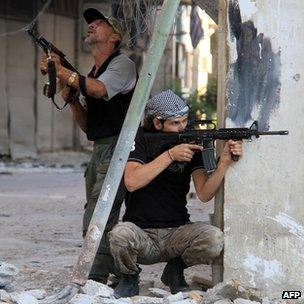Belgium dilemma over Syrian 'jihadis'
- Published
Jejoen Bontinck says he was volunteering in Syria, as Duncan Crawford reports from Antwerp
Authorities in Belgium fear Jejoen Bontinck is an Islamist threat to their country. His Catholic father says this is nonsense. How should Europe deal with young citizens returning from Syria?
Around 20 police officers descended on a house in Antwerp last week to arrest Jejoen Bontinck.
The 18-year-old had just returned from Syria, having spent eight months in the north of the country.
He was held on terrorism-related charges and this week a court in Antwerp remanded him in custody for a month while police investigate his case.
Mr Bontinck denies the charges. He says he worked as a driver at a hospital helping Syrians injured in the civil war.
"I worked delivering medical supplies, driving injured and sick people from one place to the other," he told reporters before his arrest.
"I love helping people," he said, strolling along dressed in jeans, a puffer jacket and woolly hat.
Terror fear
He is among scores of Europeans who have travelled to Syria in the last few years. Various estimates put the figure at 500-600.
Britain, Belgium, France and the Netherlands are among EU countries to have expressed concern that their citizens could become radicalised by groups linked to al-Qaeda and potentially return to launch attacks at home.
The Belgian authorities believe Jejoen Bontinck may have been involved in fighting in the civil war and have accused him of being a member of a terrorist group - something he denies.
"No, I was never part of an organisation," he says. "If I had been fighting, I would be dead now like all the others."
Mr Bontinck was brought up a Catholic by his Belgian father and Nigerian-born mother. His father says he converted to Islam when he was 15 after meeting a Muslim girl.
He was a talented dancer, even performing in a Belgian music video. But then he became involved with the now defunct group Sharia4Belgium.
Earlier this year Belgian police raided dozens of houses of people linked to the organisation. It is accused of recruiting more than 30 people to fight in Syria in the past year.
Loyal father

Rebels in Damascus: Europe wants to prevent Syria's violence spreading
The mayor of Antwerp says the authorities can afford to take no risks.
"He [Jejoen Bontinck] says he only did humanitarian work, but there are holes in his story," says Mayor Bart de Wever, who is also leader of the right-wing separatist New Flemish Alliance (N-VA).
"He needs to be interrogated. I have no interest as a mayor in having icons of Muslim radicalisation or jihadis here in my town, recruiting for a holy war or even being a source of new radicalism and maybe even terrorism perpetrated here on our own soil."
Belgium has also acted against fears that militants are still collecting unemployment benefits while fighting in Syria, deleting them from the welfare list.
Jejoen Bontinck's case is well known because of his father's campaign to bring him home.
Dimitri Bontinck, a former soldier, travelled twice to Syria. He has written a book about his experiences, detailing how he was beaten, held hostage and subjected to death threats by Islamist fighters while trying to find his son.
He failed to find him and is elated his son has now returned, but is critical of the Belgian authorities, saying politicians should not get involved in the case.
Security dilemma
"They need to release him. This is not the way to treat our youngsters when they return from Syria," says Dimitri Bontinck.
"What these youngsters need is love and family around them, not to stigmatise them and put them in a prison."
He told the BBC he was "a thousand percent sure" his son was not involved in fighting in Syria. "He told me he never shot one bullet. He wouldn't be here [in Belgium] today, safely, if he was a member of any kind of group, because they would never let him go."
There have been other high-profile cases involving young Belgians travelling to Syria. Nineteen-year-old Brian de Mulder, also from Antwerp, left for Syria in January this year and is believed to be staying somewhere close to Damascus.
Earlier this year his family told the BBC of their agony waiting for news of their son.
Intelligence agencies are aware that Syria has become the go-to destination for Islamist fighters around the world.
The difficulty for security services in Europe is how to decide who is a threat and who is not, and how to successfully prosecute the former.
For Jejoen Bontinck, he will have to wait and see whether Belgian police believe his story or whether they think he helped recruit other people to fight in Syria as well.